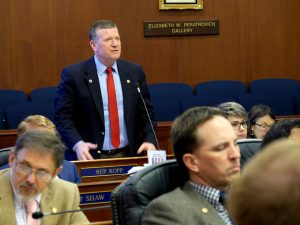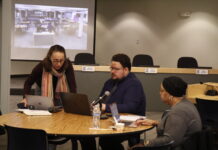
The Alaska House passed a budget on Thursday that includes $257 million in cuts to the portion of the state budget the Legislature directly controls. That’s about a quarter of what Gov. Mike Dunleavy has proposed.
The budget passed on caucus lines, 24-14, with two members absent.
The largest change the House made on the floor was to school bond debt reimbursement. It restored roughly half of the $68 million that the House Finance Committee had removed from the budget. That means municipalities would have to make up roughly $34 million, potentially through property-tax increases. It also restores $20 million in funding for schools in the Unorganized Borough.
The House restored funding for dairy inspections.
But it didn’t include funding for permanent fund dividends, which will be considered in a separate bill. Rep. Neal Foster, a Nome Democrat, said that if the House budget is adopted, PFDs could be slightly less than $1,300. He noted that other House members want PFDs equal to at least last year’s $1,600, while others want dividends equal to half of this year’s projected draw from permanent fund earnings, which would be nearly $2,300. Dunleavy wants full dividends under the current legal formula, which would equal $3,000.
Minority-caucus Republicans expressed frustration that 20 budget amendments — some of which were related to PFDs — weren’t considered during the budget floor debate.
Anchorage Rep. Lance Pruitt, the minority leader, said the amendments should have been heard.
“Everyone should have the opportunity to offer up their thoughts on anything that’s in front of us, and that was subverted,” Pruitt said during a Thursday afternoon press conference.
For their part, minority members said many minority-caucus amendments were debated on the floor — and that the minority had unlimited opportunities to propose amendments in the House Finance Committee and its subcommittees.
Anchorage Republican Rep. Chuck Kopp said the budget process should be about more than achieving a certain dividend level.
“We have to ask ourselves: ‘Is it more important to blindly follow a certain dollar amount, no matter how you get there, or is it more important to arrive at a plan that leaves our vulnerable populations taken care of, our education system strong, our public safety protected, our workforce development healthy?’” said Kopp, who is a member of the House majority, which has 15 Democrats, eight Republicans and two independents.
Now the focus shifts to the Senate, and the Senate Finance Committee is aiming to move the budget to the full Senate by early May.
The Senate may push the budget more toward the level of cuts that Dunleavy proposed, but senators also have said they see spending reductions as a multi-year process.
The Senate may have more of a focus on the policy implications of budget changes, rather than just achieving a certain level of cuts.
For example, Senate President Cathy Giessel said the Senate’s focus on setting education policy will be on student outcomes.
“The policy changes are not to find a way to reduce funding to education — they’re ways to improve our outcomes,” said Giessel, an Anchorage Republican. “Because that’s really what we’re trying to get to. The focus of education is on the student, not on the checkbook.”
Lawmakers also are aware that Dunleavy can remove spending with the line-item veto. There are legal disputes over how deeply he can reduce the education and Medicaid budget. But there are fewer constraints on how deep cuts to the university and the ferry system can be.
Both the House and Senate plan to work on criminal justice bills next week. And more work is scheduled on Dunleavy’s three constitutional amendment proposals. But it’s not clear whether the amendments will pass this year, or advance to a point where they may pass next year, when they would be placed on the ballot for voters. Amendments require two-thirds of both legislative bodies to pass them, as well as a majority of voters.
Sunday is the 90th day of the legislative session. The Legislative will exceed this limit for the ninth time in the 13 years since Alaskans passed an initiative setting the limit. Two other sessions were 91 days. But some of the sessions that were at or below the legal limit left unfinished business that had to be completed in special sessions.
The state constitution has a separate, 121-day limit on the length of sessions. This year, the 121st day will be May 15.
Andrew Kitchenman is the state government and politics reporter for Alaska Public Media and KTOO in Juneau. Reach him at akitchenman@alaskapublic.org.




